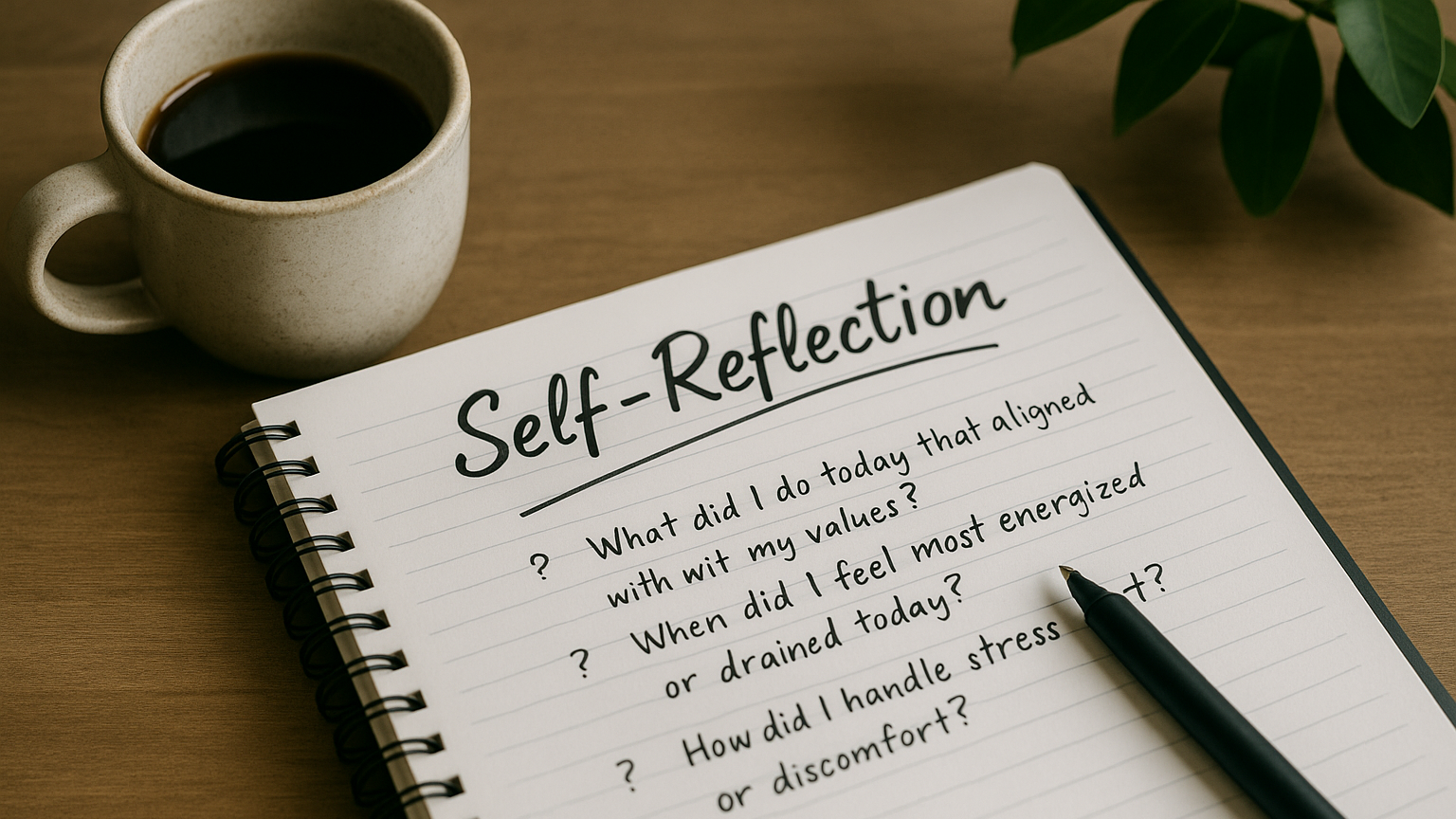Ever feel like you’re on autopilot, reacting to situations without really understanding why? You’re not alone. Most of us spend our days disconnected from ourselves until something happens and we think, “Why did I react that way?”
Here’s the good news: you can change this starting today. And no, you don’t need years of therapy or to become a Buddhist monk. These simple self-awareness techniques fit easily into your daily routine and, as a result, help you understand yourself better from the very first day.
What Is Self-Awareness (And Why It Matters So Much)?
Self-awareness is your ability to look inward and truly understand what’s happening: your thoughts, emotions, values, and behaviors. It also means being able to observe yourself honestly, without harsh judgment.
When you develop this skill, life shifts in meaningful ways. As a result, you begin making decisions aligned with who you really are, not what others expect. Your relationships also become more authentic because you communicate better. Furthermore, you start managing your emotions instead of being controlled by them. And those goals you’ve been putting off begin to make sense again.
Self-awareness is not something you either have or don’t have. Instead, it’s a skill you develop, much like learning to cook or play an instrument. As you practice self-awareness techniques consistently, your ability improves.
For a deeper look into emotional clarity, you can also read this related article:
https://personalorb.com/emotional-awareness-better-decisions/
1. The “Pause and Observe” Method (Your Daily Reset Button)
When you’re about to snap at someone or make an impulsive decision, that’s where the real power of self-awareness lives. In those moments, pausing intentionally makes a significant difference.
Before reacting, pause for 30 seconds and ask yourself:
What am I feeling right now?
Why am I reacting this way?
What do I actually need in this moment?
This brief pause reveals emotional and behavioral patterns you didn’t even realize were shaping your reactions. As a result, situations that once overwhelmed you start becoming more manageable.
Pro tip: Set two or three reminders on your phone during the day asking, “How are you feeling?” Although it may seem silly at first, it works remarkably well.
2. Keep a Self-Reflection Journal (A Core Self-Awareness Technique)
You don’t need to write a full page every day. Sometimes three sentences bring more clarity than you expect. Moreover, journaling helps you track subtle patterns that would otherwise go unnoticed.
Use a notebook or your phone’s notes app. What matters is moving thoughts from your mind onto paper.
Consider these self-awareness journal prompts:
What did I do today that truly made sense to me?
When did I feel lightest or heaviest?
How did I handle a difficult moment?
What pattern am I starting to notice?
3. Switch “Why” to “What” Questions (A Simple Technique With Big Impact)
When you ask “Why do I always mess everything up?”, your mind goes into shame mode. Consequently, you feel worse and gain no insight.
Compare the difference:
“Why am I so disorganized?”
“What can I do to get more organized?”
“What” questions open doors and shift your focus from guilt to growth. As a result, they become some of the most effective self-awareness techniques for reframing thoughts.
4. Discover Your Core Values (Your Internal GPS)
Values are the principles that truly matter to you. Unfortunately, many people end up living by values that aren’t actually theirs. Consequently, their decisions feel empty or misaligned.
Try this:
Think of moments when you felt proud or fulfilled. What values were present? List your top five values and revisit them before making important decisions. This simple habit often leads to more aligned and intentional choices.
To explore this topic further, read:
https://personalorb.com/the-power-of-self-awareness-in-personal-and-professional-life
5. Practice Mindful Breathing (Body-Mind Awareness)
Self-awareness isn’t just mental. Your body is constantly sending signals, and tuning into them expands your understanding of yourself. In addition, mindful breathing helps ground your attention in the present moment.
A simple practice:
Sit comfortably for two or three minutes. Close your eyes and observe your breath. Whenever your mind wanders, gently bring it back.
Through this practice, you begin noticing tension, emotions, and mental clutter that you may have ignored.
For insights on the link between mindfulness and emotional intelligence, see:
https://hbr.org/2015/12/how-mindfulness-helps-you-become-a-better-leader
6. Ask for Honest Feedback (A Bold but Powerful Technique)
Others often see things about us that we can’t. For this reason, asking for feedback becomes one of the fastest ways to accelerate self-awareness.
Ask someone you trust:
“What strength of mine do you think I don’t value enough?”
“Is there a habit I have that might be limiting me?”
Listen without defending yourself. Accept the insight and reflect on it afterward. Ultimately, this openness helps you see blind spots more clearly.
7. Observe Your Self-Talk (Your Inner Voice Shapes Everything)
Pay attention to how you speak to yourself, particularly during challenging moments. After all, your inner voice influences your emotional responses.
Do you say, “I’m so foolish”, “I always fail”, “This always happens to me”?
Or do you think, “I’m learning”, “That was difficult but I will grow from it”?
Your inner dialogue influences your self-image profoundly. Consequently, improving it creates space for growth.
8. Do a Weekly Personal Check-In (Consistency Builds Awareness)
Choose a day each week and spend 15 to 20 minutes reflecting. Over time, this reflection strengthens your awareness in a steady, sustainable way.
Ask yourself:
What went well this week?
What challenges did I face?
What did I learn about myself?
What do I want to improve next week?
This consistent practice helps you notice patterns, adjust your direction, and stay connected to yourself.
9. Identify Your Emotional Triggers (Essential for Deep Self-Awareness)
Triggers are situations that provoke strong, often disproportionate reactions. Because they reveal unresolved beliefs or fears, recognizing them is essential.
The next time you feel triggered, pause and ask:
“What part of me feels threatened right now?”
“What story am I telling myself?”
This awareness becomes the first step toward emotional mastery. Eventually, you learn to respond with more clarity and calm.
10. Be Patient With Yourself (This Journey Takes Time)
Self-awareness is lifelong. It isn’t about perfection but about noticing, learning, and making conscious choices. Over time, your efforts compound into meaningful change.
Give yourself credit for every small improvement.
How Self-Awareness Techniques Transform Your Life
With consistent practice, you begin to respond rather than react. You also start understanding your emotions instead of being dominated by them. Moreover, you gradually break long-standing patterns. As a result, you make decisions aligned with your true self.
Final Thoughts: Small Practices, Big Impact
You don’t need to change your whole life at once. Begin with one self-awareness technique and practice it daily. When you’re ready, introduce another. Over time, these small steps create significant transformation.
As your self-awareness grows, your life becomes more intentional and aligned. Every step strengthens your connection with yourself.
You’ve already taken the first step. Now keep going.

